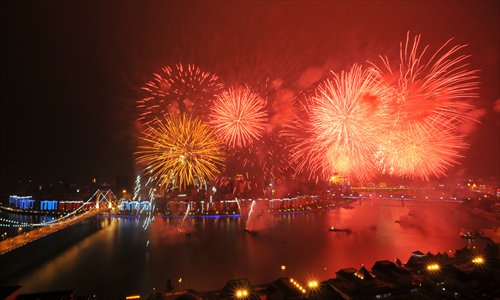Pollution darkens festival of fireworks

Fireworks light up Liuzhou in Guangxi Zhuang Autonomous Region in 2012. During the recent Spring Festival the event was banned over smog concerns. Photo: IC
As Spring Festival fever enveloped China, so did dense smog, which shrouded many Chinese cities. With pollution weighing heavily on the minds of leaders and the Chinese public, modern problems have collided with the traditional custom of setting off fireworks. Four Global Times journalists shared their experiences of how attitudes toward fireworks have changed.
Clash with tradition
By Yu Jincui
My first day of the Chinese lunar new year began with the noise of firecrackers. In Nanfeng, a village of Zibo in the central region of Shandong Province, people got up early and celebrated Spring Festival with a string of firecrackers at 6 am to frighten off evil.
On my way to visit and wish relatives and neighbors a happy new year, I saw jubilant kids wearing masks, due to the thick smog. Still, they let off firecrackers.
As a heavy chemical industry city, Zibo has benefited from the booming petroleum, petrochemical, electric and ceramic industries in recent decades, while at the same time, is infamous as one of the most polluted cities in China.
"No fireworks, no Nian (Spring Festival)," Zhang Qiang, a villager working in a local cement plant, told me. He said the sound of firecrackers is indispensable to the atmosphere of Spring Festival, especially when many customs of the festival have been deserted. Zhang, in his late 50s, said that several decades ago, the junior generation had to kowtow to the elders to wish them a good new year, but now it has already become an outdated fashion.
It remains to be seen where Chinese Spring Festival will go in the tangle of economic development, environmental protection and the public's lust for possessions.
Silent night
By Hu Qingyun
On February 1, 2014, the second day of the Year of the Horse, I walked along an embankment in my hometown, Liuzhou, Guangxi Zhuang Autonomous Region. The peaceful night scene beside the river felt eerily quiet.
To people in my hometown, the night of the second day of the Chinese new year is meant for gathering to enjoy fireworks and music by the riverbank. The streets are blocked and people queue for the show. The event is usually followed by lingering smog.
Meanwhile, the musical firework gala was canceled this year, due to pollution concerns.
The city recorded its highest PM2.5 reading after a firework frenzy on the Spring Festival eve in 2013, which was 20 times higher than the normal average readings, Liuzhou Daily reported.
Liuzhou, a city famous for its manufacture, has suffered from pollution problems in the past, including acid rain.
As I walked along the embankment, I came across several teenagers lighting up a few firecrackers and cheering.
It may seem like a quiet new year, but I guess the joy of celebration cannot be killed.
Nuisance subsides
By Yang He
Fireworks have been more of a burden than a joy for me, as I was worried about hurting myself. They also made it difficult to talk during the festival, as we would have to shout at each other to be heard over the loud noises outside.
But this year, things were quieter. Booths selling fireworks have become rarer in Beijing. In the past there were always a few stalls selling fireworks scattered around my neighborhood, but this year I found none. Meanwhile, posters were scattered across the city streets, urging people to reduce their consumption of fireworks.
In previous years, the smog caused by fireworks was so bad that it smelled like a battlefield. This year, it didn't feel quite so bad. I have also heard less news about injuries caused by fireworks.
Fighting smog
By Zhang Ye
While most Chinese were ringing in the Year of the Horse with the traditional barrage of firecrackers, the celebrations in my hometown, Xingtai, a heavy industry city in North China's Hebei Province, were much quieter than usual.
During Chunwan - the Spring Festival Gala, screened by China Central Television on the lunar new year's eve (January 30), there were neither colorful fireworks nor roaring firecrackers, leaving only silence outside windows.
This is largely because the local government announced a ban on firecrackers as well as fireworks in the urban area in September. Many people around me thought this further weakened the atmosphere of Spring Festival and expressed concerns that environmental protection at the expense of traditional customs may lead to strong resistance toward the ban in the long term.
But currently, there is no such mood, and it seems that residents are willing to compromise when confronted with heavy smog. The Xingtai government seems to be more determined to tackle the smog, as the city, less than two hours away from Beijing by high-speed railway, frequently came under the spotlight last year as the most polluted area of the country.